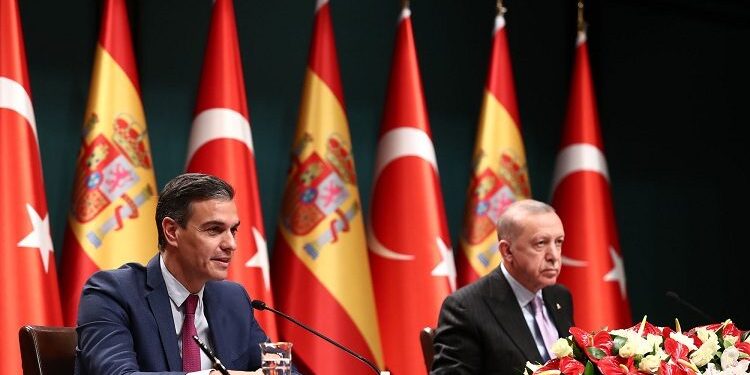The Diplomat
The President of the Government, Pedro Sanchez, offered yesterday in Ankara the support of Spain to the “progressive rapprochement” of Turkey to the European Union, while the Turkish President, Recep Tayyip Erdogan, thanked “the support of Spain” to improve relations with the EU against the “petty plans of some member countries”.
“The bilateral relationship between Spain and Turkey has reached an extraordinary degree of maturity in an almost natural way, which has been extending towards a myriad of economic sectors and areas of our social and cultural life,” said Sánchez at the press conference following the VII Spanish-Turkish Summit, held yesterday in Ankara.
The two countries, he continued, are two “allies” in NATO with a “common approach to continental security” and whose greatest exponent is Spain’s contribution to the security of Turkey’s eastern border through the Patriot anti-missile device. During their meeting, the two presidents discussed precisely the preparation of the next NATO Summit, to be hosted by Spain in June 2022. “For the success of this Summit, the voice of a member such as Turkey, a European but non-EU member, and from the southern flank, such as Spain, will be particularly relevant,” stressed the head of the Executive.
Likewise, Pedro Sánchez warned that “Turkey is not only a neighbor, but an essential partner and ally for the European Union” and, therefore, he encouraged to “persevere in the effort” for the “progressive rapprochement” between Ankara and the Union and offered to “work together” in favor of a “positive European agenda” with Turkey. The head of the Executive also recalled that Spain continues to support Turkey’s status as a candidate country for accession to the European Union.
For his part, Erdogan assured in the same joint press conference that Turkey has shown an “attitude in favor of dialogue and diplomacy with the aim of implementing the positive agenda” with the European Union and thanked “the support of Spain to improve relations between Turkey and the EU” in the face of “the petty plans of some member countries”. “Turkey and Spain, which guard the borders of NATO and Europe, bear the brunt of the burden of irregular immigration,” so it is necessary to “work out joint policies for a fair burden sharing” and “it would be beneficial for all parties if Spain continues its valuable support.”
Declaration and agreements
The Summit was chaired by Sánchez and Erdogan and was attended by the Second Vice President and Minister of Labor and Social Economy, Yolanda Díaz; the Third Vice President and Minister for Ecological Transition and the Demographic Challenge, Teresa Ribera; the Minister of Foreign Affairs, José Manuel Albares; the Minister of Defense, Margarita Robles; the Minister of the Interior, Fernando Grande-Marlaska; and the Minister of Industry, Trade and Tourism, Reyes Maroto; as well as their Turkish counterparts.
During the Summit, the two governments agreed on a Joint Declaration which highlights “the excellent state of relations between the two countries” and which sets out in detail the cooperation in the areas dealt with in the bilateral sectoral meetings. Five Memoranda of Understanding (MOUs) were also signed on renewable energies and energy efficiency, water resources development and management, sports, science and collaboration in the fight against natural disasters, as well as a declaration of intent on labor.
Tensions with the EU
The meeting came shortly after the EU managed to defuse what appeared to be a new diplomatic crisis with Ankara, following Turkey’s initial decision (later cancelled) to expel the ambassadors of Germany, Denmark, France, Finland, the Netherlands, Sweden, Norway, New Zealand, Canada and the United States for calling for the release of Turkish businessman and activist Osman Kavala, who has been in custody for four years.
This diplomatic problem has joined other disagreements recorded in recent months between the EU and Turkey, such as unauthorized drilling by the Turkish authorities in the eastern Mediterranean, which were harshly condemned by Greece and Cyprus and led to the adoption of sanctions by the EU that were renewed last week until November 2022. In this regard, Sanchez yesterday recalled the “prominent role” played by Spain in channeling the tension in the eastern Mediterranean.
Another important difference between Turkey and the EU is related to the eternal problem of Cyprus, a country divided since 1974 between a self-proclaimed Turkish Republic of Northern Cyprus, only recognized by Ankara, and the Republic of Cyprus, a majority Greek-Cypriot entity, with its capital in Nicosia, which does have international recognition and even appears as a member state of the EU. Spain has reiterated on numerous occasions that the solution to the conflict should be based on the parameters of the United Nations (which advocates a unification of the island as a bizonal and bicommunal state) and on the adoption of confidence-building measures to improve relations between Turkey and the EU.





